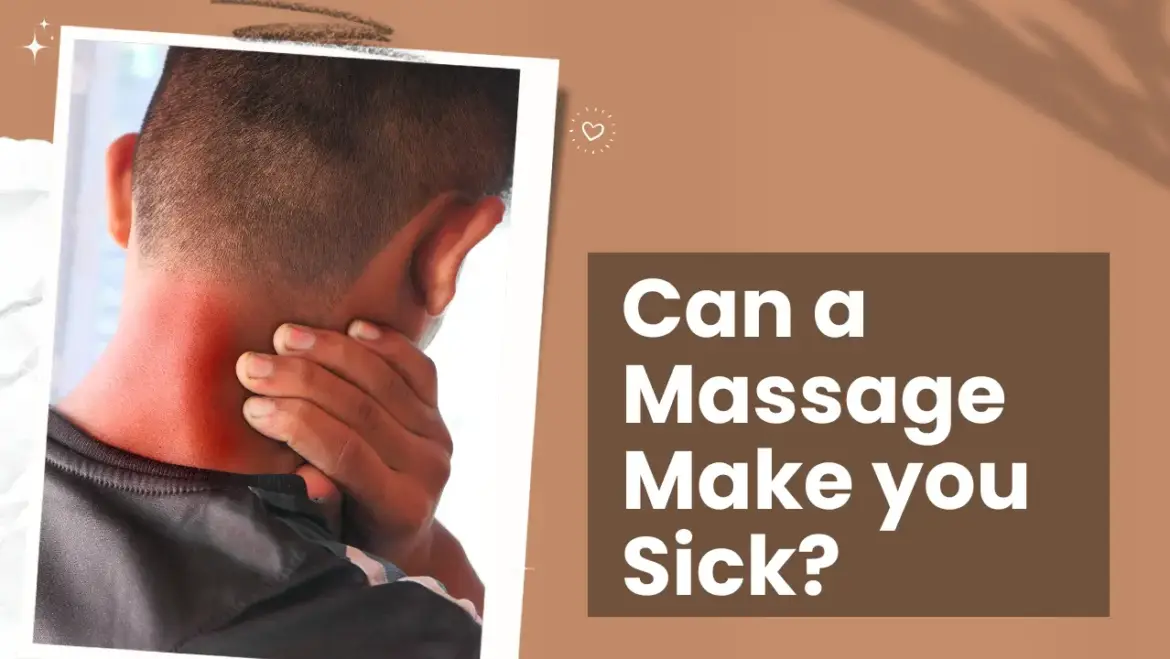Massage therapy is well known for its many benefits—relaxation, stress relief, improved circulation, and pain reduction. However, some people report feeling unwell after a session. This can be confusing or even alarming, especially if you’re new to massage.
So, can a massage really make you feel sick? The answer is yes, but it’s typically temporary and not a sign of anything dangerous. In this article, we’ll explore why you may feel sick after a massage, what symptoms are common, and how to prevent them.
Can a Massage Make You Sick?
Yes, in some cases a massage can cause short-term symptoms that feel like illness. These may include:
- Nausea
- Headache
- Flu-like symptoms
- Dizziness or lightheadedness
- Fatigue
- Muscle soreness
- Emotional sensitivity or irritability
These symptoms are usually short-lived and often indicate that your body is processing the effects of the massage.
Why Do You Feel Sick After a Massage?
There are several reasons why you might feel unwell following a massage. Here are the most common explanations:
1. Circulatory and Lymphatic System Changes
Massage boosts circulation and stimulates the lymphatic system. This encourages the movement of metabolic waste through the body, and if your system isn’t used to it, you might feel temporary symptoms such as fatigue, headaches, or nausea. While the term “toxins” is often used, it’s more accurate to say your body is processing waste more efficiently.
2. Emotional Release
Massage can trigger emotional responses by relieving physical tension tied to stored stress or trauma. It’s not uncommon to feel mentally exhausted, irritable, or even tearful after a session. This is known as an emotional release and can be part of the healing process.
3. Dehydration
Massage increases circulation and fluid movement in your body, which may contribute to mild dehydration if you haven’t consumed enough water. Dehydration can lead to headaches, dizziness, and fatigue.
4. Muscle Soreness
Deep tissue or sports massage can create a similar effect to a workout, resulting in delayed onset muscle soreness (DOMS). This can make you feel stiff or achy and, in some cases, contribute to a general sense of malaise.
5. Receiving a Massage While Sick
If you’re already fighting an illness or your immune system is compromised, a massage may make you feel worse. It’s always best to reschedule if you are experiencing cold or flu symptoms, fever, or any form of infection.
Common Post-Massage Symptoms and Possible Causes
| Symptom | Possible Cause |
|---|---|
| Nausea | Detox reaction, lymph movement |
| Headache | Dehydration, increased circulation |
| Fatigue | Emotional release, circulation changes |
| Flu-like symptoms | Muscle soreness, immune response |
| Dizziness | Blood pressure fluctuation |
| Muscle soreness | Deep tissue pressure, DOMS |
| Emotional changes | Nervous system and stress release |
How Long Do These Symptoms Last?
- Mild symptoms usually resolve within a few hours.
- Muscle soreness may last up to 48 hours.
- Emotional symptoms may linger for a day or two but typically subside on their own.
What to Do If You Feel Sick After a Massage
Hydrate
Drink plenty of water before and after your massage. This supports your lymphatic system and helps flush out waste.
Rest
Give your body time to adjust. Avoid strenuous activity or alcohol immediately after the massage.
Eat Light
Choose nutritious, light meals. Avoid heavy, greasy foods or excessive caffeine after your session.
Take a Warm Bath
A warm bath with or without Epsom salts can help ease sore muscles and enhance relaxation.
When Should You Be Concerned?
While most post-massage symptoms are temporary, you should contact a healthcare provider if you experience:
- Persistent symptoms lasting more than 48 hours
- A high fever
- Sharp, localized pain
- Swelling, redness, or signs of infection
Who Is Most Likely to Feel Sick After a Massage?
- First-time massage clients
- People who are dehydrated or undernourished
- Individuals undergoing detox or fasting
- People with high stress levels or unresolved emotional tension
- Anyone recovering from illness or with a weakened immune system
What Types of Massage Are More Likely to Cause These Symptoms?
Some massage techniques are more intense and stimulate deeper changes in the body, making post-massage symptoms more likely. These include:
- Deep Tissue Massage
- Trigger Point Therapy
- Myofascial Release
- Lymphatic Drainage Massage
- Sports Massage
Frequently Asked Questions (FAQs)
Is it normal to feel nauseous after a massage?
Yes, this can happen due to increased lymphatic movement and circulation. It is generally temporary.
Why do I get a headache after massage?
Often it’s due to dehydration or the release of muscle tension. Drinking water and resting typically helps.
What should I do if I feel dizzy after a massage?
Sit or lie down slowly, drink water, and give your body time to stabilize.
Can massage release toxins?
Massage helps move metabolic waste through the lymphatic system. While “toxins” is a loose term, your body may be eliminating waste products more efficiently.
Is it safe to get a massage while sick?
No. Massage can worsen symptoms and potentially spread illness to your therapist.
How can I avoid feeling sick after a massage?
Hydrate well, eat light meals, get rest, and communicate openly with your therapist about your health history.
Final Thoughts
While feeling sick after a massage can be uncomfortable, it is usually harmless and temporary. These responses are part of your body’s adjustment to the increased circulation, physical release, and emotional shifts that massage can bring. By staying hydrated, getting proper rest, and listening to your body, you can minimize these effects and maximize the benefits of massage therapy.

